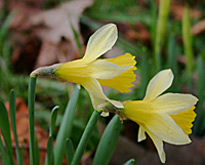Survey explores how gardeners are adapting to a changing climate
Release Date 27 March 2013

As gardeners and farmers across Britain survey the frost damage and delayed growth of their plants this Easter, scientists at the University of Reading are asking gardeners to participate in a new survey to understand how gardeners are responding to the UK's changing climate.
Vines growing in Scotland, olive trees in England and longer, drier summers - these were among the long-term predictions 11 years ago in a landmark report commissioned by, among others, the Royal Horticultural Society (RHS), based on work by scientists at the University of Reading.
Now scientists are conducting the biggest survey of its kind to find how gardeners are responding to the reality of Britain's changing climate, which has been dominated in recent years by cold spells in winter, extended periods of drought, record rainfall and flooding.
The new survey, again commissioned by the RHS, follows on from the 2002 report ‘Gardening in the Global Greenhouse'. Since then, our understanding of how climate change is affecting Britain has developed considerably.
Dr Claudia Bernardini, a climate change plant scientist at the University of Reading and RHS, said: "Over the past three winters many optimistic gardeners have seen borderline hardy plants such as the Canary Island Date Palm (Phoenix canariensis), Soft tree fern (Dicksonia antarctica) and Hardy banana (Musa basjoo) killed by severe frosts and snow. Yet, despite this, climate models continue to predict a warming of the climate and we are told to prepare for much hotter summers in the medium term.
"The Royal Horticultural Society with the University of Reading are now launching a survey to better understand how individual gardeners are reacting to these difficult growing seasons and to discover whether they have been provided with the knowledge they need to plan their gardening for the future.
"The latest projections indicate that the climate is likely to affect gardens and gardening in a significantly different way than that predicted in 2002."
The results of the survey will help researchers understand the perceived effects of climate change and the individual's response to those changes. The results will be used alongside the latest climate models to produce a new report to support British gardeners and the horticulture industry.
"Whether you are a keen gardener or new to gardening, whether you visit parks and public gardens regularly or just occasionally, we would like to hear your view and personal experience of the effects of a changing climate," Dr Bernardini added.
Take the online survey here >>>
ENDS
For more details contact the University of Reading press office on 0118 378 7391 or p.castle@reading.ac.uk.
Notes to editors:
The online survey is available at: http://blogs.reading.ac.uk/crg/climate-change-and-gardening/
In order to support UK gardens, gardeners and the horticulture industry, the RHS and the University of Reading are assessing the consequences of a changing climate based on the latest climate models which will be subsequently published in a new report by Professor Paul Hadley, School of Agriculture, University of Reading, Dr Alastair Culham, School of Biological Sciences, University of Reading, and Dr John David, Chief Scientist at the RHS.
The University of Reading is ranked among the top 1% of universities in the world (THE World University Rankings 2012). Its School of Agriculture, Policy and Development is one of the leading centres of research and teaching into agriculture in the world, and is ranked number one in the UK for the quality of its Agriculture courses (Guardian University Guide 2013). The School of Biological Sciences is a research-intensive institution with two sections covering activities in biomedical sciences and environmental biology.
The University is also home to the Department of Meteorology and the Walker Institute of Climate System Research, both internationally renowned centres for research into weather and climate.
